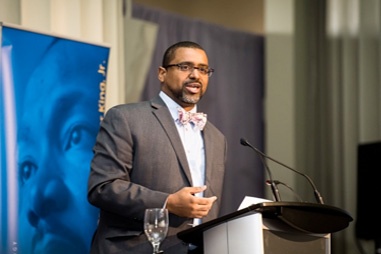MLK Luncheon: America’s bank of justice is overdrawn but not bankrupt
MLK Luncheon: America’s bank of justice is overdrawn but not bankrupt
David L. Chandler | MIT News Office | February 15, 2019
Rahsaan Hall of the ACLU’s Massachusetts branch delivers keynote at annual MIT event.

In one of the less-remembered passages of Martin Luther King Jr.’s celebrated “I have a dream” speech in 1963, he spoke eloquently about the large debt owed by this country to its black citizens after centuries of oppression — which he described as a bad check that was being returned from the bank of justice, marked “insufficient funds.”
That passage formed the theme for this year’s 45th annual MIT Martin Luther King Jr. celebration luncheon, which featured a keynote address by Rahsaan Hall, director of the Racial Justice Program for the Massachusetts branch of the American Civil Liberties Union. “We refuse to believe the bank of justice is bankrupt,” the event’s program proclaimed.
MIT President L. Rafael Reif, referring to King’s words, said that “he spoke at a moment when the nation was rocked by painful inequality and violent suppression. Yet somehow, even in the face of so much turmoil, he was hopeful.”
Reif continued, “He made it clear that, to remain true to its ideals, America’s ‘bank of justice’ owes everyone the same essential guarantee of freedom and equality. Today, we obviously have not conquered discrimination, inequality, and violence. But I believe we can see some signs that the story is changing. And we can certainly see opportunities for each of us to help accelerate that change.”
As one clear example of that progress, he said, “Let’s take a moment to appreciate the fact that the U.S. Congress is now the most diverse in our nation’s history!” And, he said, despite the disturbing stories about political leaders in Virginia who were found to have worn blackface, “even in this discouraging story, I believe there is an important thread of hope.” In King’s time, he said, such activities would have been considered routine, but that’s no longer true. “Today — fortunately, finally! — it is a public outrage.”
In introducing Hall, Reif cited some of his achievements working with the ACLU: “Through a strategic combination of advocating on Beacon Hill, pursuing targeted lawsuits, and engaging people in their neighborhoods, Rahsaan works to advance racial justice in communities across the state,” he said.
Hall also reflected on King’s famous speech, pointing out that while his uplifting words of hope are well-remembered, and the speech “touches us in a very special way,” sometimes people gloss over the tough critique of American society that he also expressed. King referred to the lives of African-Americans as “a lonely island of poverty in the midst of a vast ocean of material prosperity,” and he went on to say that “it’s obvious today that America has defaulted on its promissory note … instead of honoring its sacred obligations, it has given its Negro citizens a bad check.”
He added that King said “he refused to believe that the bank of justice is bankrupt. He refused to believe that there are insufficient funds in the great vaults of opportunity of this nation. So we have come to cash this check, that will give us on demand the riches of freedom and security of justice.”
Hall pointed out that while King spoke of the lofty vision embodied in the U.S. Constitution, its drafters never really imagined that it would apply to all of humanity, including black people, native Americans, and women. “Even though King’s vision was one of hope and of high ideals, the reality is that this [Constitution] is a document that is rooted in a history of white supremacy. Not white supremacy as people think of skinheads and neo-Nazis and alt-right, but white supremacy as a system or structure of beliefs that center and prioritize and lift up and normalize white lives, white values, white beliefs, at the expense of the lives, values, property, behavior, and cultures of people of color.”